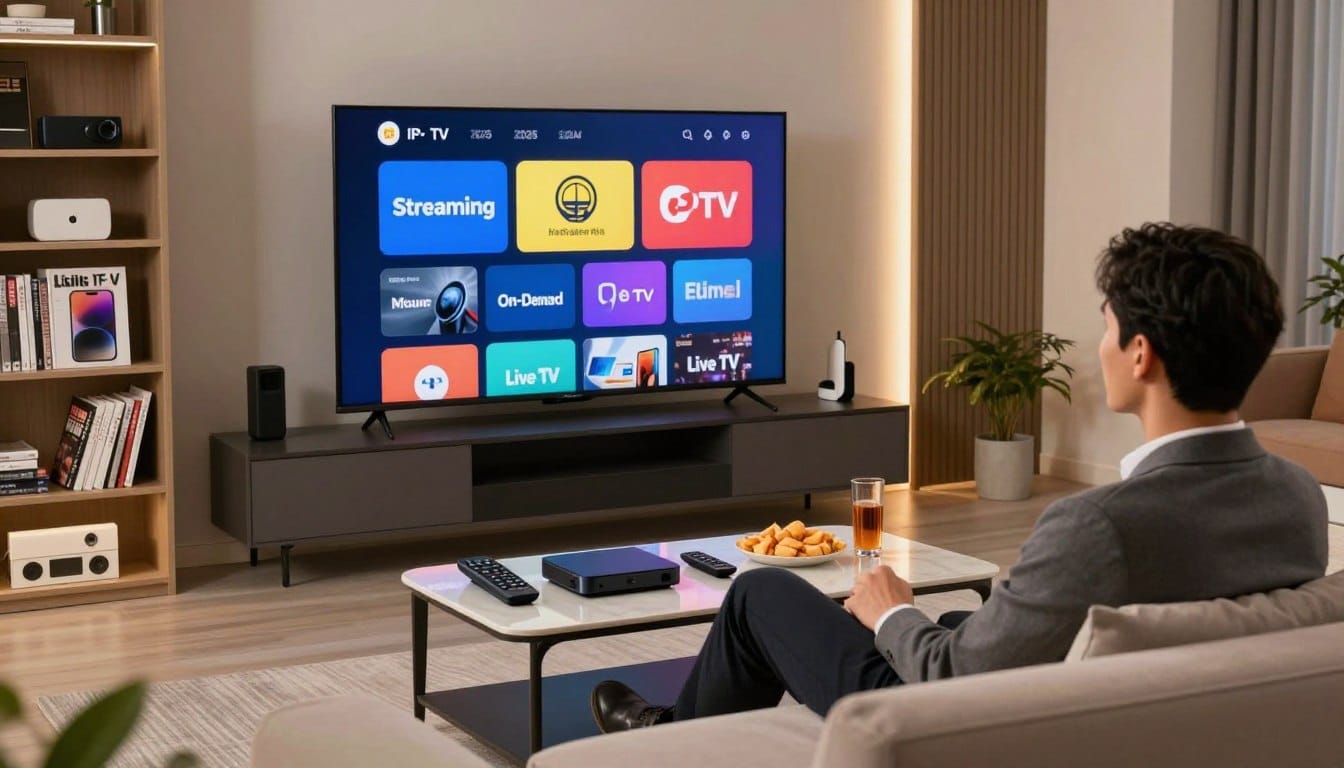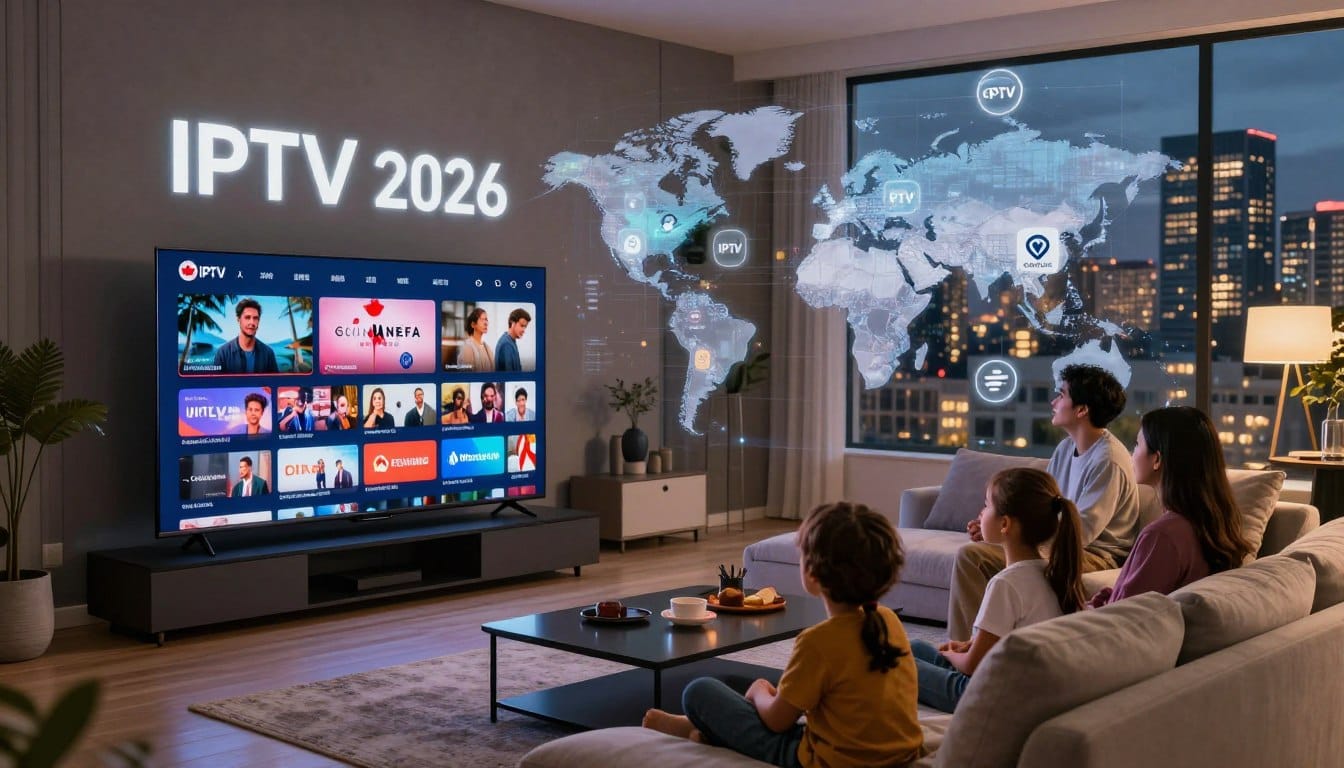Internet Protocol Television, commonly referred to as IPTV, is revolutionizing the way we consume television content. Unlike traditional satellite or cable formats, IPTV delivers television content over the internet, allowing for a more personalized viewing experience.
This method of content delivery enables users to stream their favorite shows and movies directly to their devices, providing greater flexibility and customization options. By utilizing internet protocol, IPTV opens up new possibilities for how we watch television.
Key Takeaways
- IPTV delivers television content over the internet.
- It offers a more personalized viewing experience.
- Users can stream content directly to their devices.
- IPTV provides greater flexibility and customization.
- It utilizes internet protocol for content delivery.
Understanding IPTV: The Basics of Internet Protocol Television
IPTV, or Internet Protocol Television, is revolutionizing the way we consume television content by delivering it through internet protocols. This technology allows for a more personalized and flexible viewing experience compared to traditional television broadcasting methods.
Definition and Core Technology Behind IPTV
IPTV is a service that delivers television content over the internet using internet protocols. Unlike traditional broadcast methods, IPTV utilizes a broadband connection to stream content directly to the viewer’s device. The core technology behind IPTV involves encoding television content into digital packets, which are then transmitted over the internet. This method allows for a more efficient and scalable delivery system.
The use of internet protocols enables IPTV providers to offer a range of services, including live TV, video on demand (VOD), and time-shifted media. This flexibility is a significant advantage over traditional TV services.

How IPTV Differs from Traditional Cable and Satellite
IPTV differs significantly from traditional cable and satellite TV in its delivery method. While cable and satellite TV rely on dedicated infrastructure, IPTV uses the existing broadband internet connection. This difference allows IPTV to offer more flexibility in terms of content selection and viewing devices.
Another key difference is the potential for lower costs with IPTV. Without the need for extensive cable or satellite infrastructure, IPTV providers can often offer competitive pricing models. Additionally, IPTV services can be accessed on a variety of devices, including smart TVs, computers, and mobile devices, enhancing the viewing experience.
How IPTV Works: The Technical Foundation
Understanding how IPTV works requires a dive into its technical backbone, which is based on internet protocol delivery systems. IPTV delivers television content via the internet, using a protocol that ensures efficient data transfer.

The Internet Protocol Delivery System
The internet protocol delivery system is the backbone of IPTV, enabling the streaming of television content over the internet. This system delivers content in a way that is both efficient and scalable, meeting the demands of a large user base.
IPTV services utilize protocols such as IGMP (Internet Group Management Protocol) for multicasting, which allows a single stream to be sent to multiple users simultaneously, thus conserving bandwidth.
Content Encoding and Format Standards
For IPTV to work seamlessly, content must be encoded and formatted according to specific standards. Common formats include H.264 for video and AAC for audio, which are widely supported due to their quality and efficiency.
The encoding process involves converting the original content into a digital format that can be streamed over the internet. This is crucial for ensuring that the content is compatible with various devices and platforms.
Network Infrastructure Requirements
A robust network infrastructure is essential for delivering high-quality IPTV services. This includes a reliable internet connection with sufficient bandwidth to support the streaming of content, especially for high-definition (HD) and 4K services.
Internet Service Providers (ISPs) play a critical role in ensuring that the network infrastructure can handle the demands of IPTV, including the use of technologies like fiber-optic connections to enhance speed and reliability.
Types of IPTV Services Available Today
IPTV technology supports several types of services, each designed to offer unique benefits to viewers. This diversity in services is a significant factor in the growing popularity of IPTV among consumers.
Live Television Broadcasting
Live television broadcasting via IPTV allows users to watch their favorite TV channels in real-time, just like traditional TV. However, IPTV offers more flexibility as it can be accessed through various devices with an internet connection. Live sports, news, and events are particularly popular among IPTV subscribers.
Video on Demand (VOD) Libraries
Video on Demand (VOD) is another key feature of IPTV services. VOD libraries provide users with access to a vast collection of movies, TV shows, and documentaries that can be watched at any time. This on-demand service caters to individual preferences, allowing viewers to watch content at their convenience. The VOD service is especially appealing to those who prefer not to be tied to a broadcast schedule.
Time-Shifted Media and Catch-Up TV
Time-shifted media and catch-up TV services enable viewers to watch previously aired content at a later time. This feature is particularly useful for those who miss their favorite shows or want to watch content that was broadcast earlier.
“Catch-up TV has revolutionized the way we consume television, offering unparalleled flexibility.”
With IPTV, users can easily catch up on missed programs without being tied to a traditional broadcast schedule.
Benefits of Using an IPTV Service
The advantages of using an IPTV service are multifaceted, offering a more personalized and flexible viewing experience. With the ability to stream content over the internet, IPTV services provide a modern alternative to traditional broadcasting methods.
Cost Advantages Compared to Traditional TV
One of the significant benefits of IPTV is its cost-effectiveness. Unlike traditional TV services, which often come with hefty subscription fees and contractual obligations, IPTV services can offer more flexible pricing plans. This can result in significant savings for viewers.
- Lower monthly subscription fees
- No need for long-term contracts
- Customizable channel packages
Device Flexibility and Multi-Screen Viewing
IPTV services excel in their ability to support multi-screen viewing. Whether you’re watching on a smart TV, tablet, or smartphone, IPTV services provide a seamless viewing experience across various devices. This flexibility is a significant advantage for users who consume content on multiple platforms.
The compatibility with different devices means you can start watching a show on your TV at home and continue on your tablet during your commute.
Content Selection and Customization Options
IPTV services also offer an extensive range of content, including live TV, video on demand (VOD), and catch-up TV. This variety allows viewers to customize their viewing experience based on their preferences.
- Access to a wide range of channels and content
- Personalized recommendations based on viewing history
- The ability to pause, rewind, and record live TV
IPTV in Canada: Market Overview and Regulations
Canada’s IPTV landscape is evolving, with various providers offering a range of services tailored to different consumer needs. This evolution is driven by consumer demand for more flexible and personalized viewing options.
Legal IPTV Providers Operating in Canada
Several legal IPTV providers operate in Canada, offering a mix of live television, video on demand, and catch-up TV services. Some of the notable providers include major telecom companies that have expanded their services to include IPTV. These providers must comply with Canadian regulations, ensuring they offer a certain amount of Canadian content.
Key Players: Companies like Bell, Rogers, and Telus are among the prominent IPTV service providers in Canada, offering a range of channels and on-demand content.
Canadian Content Regulations and Requirements
Canadian content regulations play a crucial role in the IPTV landscape. Providers are required to adhere to these regulations, which mandate the inclusion of a certain percentage of Canadian content in their offerings. This ensures that IPTV services contribute to the Canadian media ecosystem.
The Broadcasting Act and regulations set by the Canadian Radio-television and Telecommunications Commission (CRTC) govern the IPTV industry. Compliance with these regulations is essential for IPTV providers to operate legally in Canada.
| Regulatory Aspect | Description | Impact on IPTV |
|---|---|---|
| Canadian Content Requirement | Mandatory inclusion of Canadian content | Ensures diversity and local relevance |
| Licensing | IPTV providers must be licensed | Legal operation and consumer trust |
| CRTC Oversight | Regulation by the CRTC | Compliance with broadcasting standards |
IPTV Adoption Trends Among Canadian Consumers
Canadian consumers are increasingly adopting IPTV services, drawn by the flexibility and customization options they offer. The trend is towards more personalized entertainment, with consumers seeking services that can be accessed across multiple devices.
As the IPTV market continues to evolve, understanding consumer trends and regulatory requirements will be crucial for both providers and consumers. The shift towards IPTV reflects broader changes in how Canadians consume media, with implications for the future of broadcasting in Canada.
Required Equipment and Setup for Your IPTV System
Setting up an IPTV system requires careful consideration of several key components. To ensure a smooth and enjoyable viewing experience, it’s crucial to understand the necessary equipment and setup requirements.
Internet Connection Requirements and Bandwidth
A stable and fast internet connection is vital for IPTV. The recommended bandwidth depends on the quality of the video stream. For standard definition (SD) content, a minimum of 3 Mbps is required, while high definition (HD) content requires at least 5 Mbps, and 4K content needs 25 Mbps or more. Ensuring your internet plan meets these requirements is essential for uninterrupted viewing.
A table outlining the recommended bandwidth for different video qualities is provided below:
| Video Quality | Recommended Bandwidth |
|---|---|
| Standard Definition (SD) | 3 Mbps |
| High Definition (HD) | 5 Mbps |
| 4K Ultra HD | 25 Mbps |
Compatible Devices: Smart TVs, Boxes, and Mobile Options
IPTV can be accessed through various devices, including smart TVs, set-top boxes, and mobile devices. Smart TVs with built-in IPTV apps offer a convenient viewing experience. Set-top boxes, such as those running Android TV or Apple TV, can also stream IPTV content. Additionally, many IPTV services offer mobile apps for smartphones and tablets, allowing for viewing on-the-go.
Step-by-Step Setup Guide for New Users
Setting up your IPTV system is straightforward. First, ensure your internet connection meets the required bandwidth. Next, choose a compatible device, such as a smart TV or set-top box. Then, download and install the IPTV app or software. Finally, log in with your credentials and start browsing through the available channels and content.
By following these steps, new users can quickly get started with their IPTV service and enjoy a wide range of television programming and on-demand content.
Legal Considerations When Choosing an IPTV Provider
When selecting an IPTV provider, it’s crucial to consider the legal implications of your choice. The IPTV market is diverse, with various providers offering different services, but not all operate within the legal framework.
The distinction between licensed and unlicensed IPTV services is fundamental. Licensed IPTV services have obtained the necessary permissions and licenses to broadcast content, ensuring compliance with copyright laws and regulations. In contrast, unlicensed IPTV services operate without these permissions, potentially infringing on copyrights.
Licensed vs. Unlicensed IPTV Services
Licensed IPTV providers have agreements with content owners, allowing them to legally stream TV channels and on-demand content. These services are typically more reliable and less likely to be shut down due to legal issues. On the other hand, unlicensed IPTV services may offer attractive pricing and content packages but come with significant risks, including service interruptions and potential legal consequences for users.
Copyright Issues and Content Licensing Explained
Copyright laws protect the intellectual property rights of content creators, including TV shows, movies, and live sports events. IPTV providers must obtain the necessary licenses to broadcast this content legally. Content licensing involves acquiring the rights to distribute copyrighted material, ensuring that creators are compensated for their work.
| IPTV Service Type | Legal Status | Risks |
|---|---|---|
| Licensed IPTV | Operates with legal permissions | Less likely to face service interruptions |
| Unlicensed IPTV | Operates without legal permissions | Higher risk of service interruptions and legal issues |
Understanding these legal considerations is vital for making an informed decision when choosing an IPTV provider. Opting for a licensed IPTV service can provide a more stable and legally compliant viewing experience.
Popular IPTV Applications and Platforms in 2023
The IPTV landscape in 2023 is diverse, with numerous applications and platforms available to consumers. This diversity caters to various user preferences, from dedicated IPTV services to multi-purpose streaming platforms that support IPTV, and even solutions tailored specifically for the Canadian market.
Dedicated IPTV Apps and Services
Dedicated IPTV apps and services have gained popularity due to their specialized features and user-friendly interfaces. Examples include IPTV Smarters and TiviMate, which offer robust IPTV experiences with features like EPG (Electronic Program Guide) and catch-up TV. These platforms are designed to work seamlessly with various IPTV providers, giving users flexibility in choosing their content.
Multi-Purpose Streaming Platforms with IPTV Support
Multi-purpose streaming platforms have also begun to incorporate IPTV support, broadening their appeal to a wider audience. Services like Kodi allow users to add IPTV functionality through add-ons, making them versatile options for those looking for a comprehensive entertainment solution. These platforms often support a wide range of devices, enhancing their utility.
Canadian-Specific IPTV Solutions
For Canadian consumers, there are IPTV solutions tailored to their specific needs, including services that focus on Canadian content. These platforms understand the regulatory requirements and content preferences of the Canadian market, offering a more localized IPTV experience. They often include a mix of Canadian channels and on-demand content, catering to the diverse interests of Canadian viewers.
The variety of IPTV applications and platforms available in 2023 ensures that consumers can find a service that meets their viewing preferences, whether they’re looking for a dedicated IPTV experience or a more versatile streaming solution.
The Future of IPTV Technology and Broadcasting
The future of IPTV is bright, with innovations in smart home integration and AI-driven content curation. As technology continues to advance, IPTV services are becoming increasingly sophisticated, offering users a more personalized and interactive viewing experience.
Integration with Smart Home Systems
One of the most significant trends in the future of IPTV is its integration with smart home systems. This allows for seamless control over various devices, creating a cohesive entertainment ecosystem. For instance, users can control their IPTV service using voice commands through smart speakers or manage their viewing experience through mobile apps.
Key benefits of IPTV integration with smart home systems include:
- Enhanced user convenience
- Improved device compatibility
- Increased accessibility for users with disabilities
AI-Powered Content Recommendations and Personalization
AI-powered content recommendations are revolutionizing the way users discover new content on IPTV platforms. By analyzing viewing habits and preferences, AI algorithms can suggest relevant shows and movies, enhancing the overall user experience. This personalization not only keeps viewers engaged but also helps IPTV providers reduce churn rates.
The impact of AI-powered recommendations is multifaceted:
- Increased user engagement
- Improved content discovery
- Better customer retention
Emerging Trends and Innovations in the IPTV Landscape
The IPTV landscape is continually evolving, with emerging trends such as cloud-based services, 5G networks, and virtual reality (VR) content gaining traction. These innovations are set to further enhance the IPTV experience, offering faster, more reliable, and immersive services.
- Cloud-based IPTV services for greater scalability
- 5G networks enabling faster and more reliable streaming
- VR content for immersive viewing experiences
Conclusion: Making the Switch to IPTV
As we’ve explored throughout this article, IPTV offers a flexible and feature-rich alternative to traditional television broadcasting. With its ability to stream content over the internet, an iptv service provides users with a more personalized viewing experience.
By switching to iptv, Canadians can enjoy a wide range of benefits, including cost advantages, device flexibility, and a broader content selection. Whether you’re looking for live television broadcasting, video on demand libraries, or time-shifted media, IPTV has something to offer.
With the right equipment and setup, making the switch to IPTV can be a straightforward process. As the technology continues to evolve, we can expect to see even more innovative features and services emerge. So why not consider making the switch to IPTV today and discover a new way to enjoy your favorite TV shows and movies?
FAQ
What is IPTV and how does it work?
IPTV, or Internet Protocol Television, is a method of delivering television content over the internet rather than through traditional satellite or cable formats. It uses internet protocols to stream content directly to your device, allowing for greater flexibility and customization in viewing experiences.
What are the benefits of using an IPTV service?
IPTV services offer several benefits, including cost advantages compared to traditional TV, device flexibility, and multi-screen viewing capabilities. You can also customize your content selection, making it a more personalized viewing experience.
What devices are compatible with IPTV services?
IPTV services are compatible with a range of devices, including smart TVs, tablets, smartphones, and dedicated IPTV boxes. You can watch your favorite content on the device of your choice, as long as it has a stable internet connection.
How do I set up an IPTV system?
To set up an IPTV system, you’ll need a stable internet connection with sufficient bandwidth, a compatible device, and an IPTV service provider. Follow the step-by-step setup guide provided by your IPTV service to get started.
What is the difference between licensed and unlicensed IPTV services?
Licensed IPTV services have the necessary permissions and licenses to broadcast content, ensuring a legitimate and high-quality viewing experience. Unlicensed IPTV services, on the other hand, may infringe on copyright laws and can be unreliable.
Can I watch live TV with IPTV?
Yes, many IPTV services offer live TV broadcasting, allowing you to watch your favorite channels in real-time. You can also access video on demand libraries and time-shifted media with some IPTV services.
What are the internet connection requirements for IPTV?
A stable internet connection with sufficient bandwidth is essential for a smooth IPTV experience. The recommended internet speed varies depending on the quality of the stream and the number of devices connected.
Are there any Canadian-specific IPTV solutions available?
Yes, there are IPTV solutions specifically tailored for the Canadian market, offering a range of Canadian content and complying with Canadian regulations.
How is IPTV evolving, and what can we expect in the future?
IPTV is integrating with smart home systems, and AI-powered content recommendations are becoming more prevalent. Emerging trends and innovations, such as improved streaming quality and new features, are expected to shape the future of IPTV.




